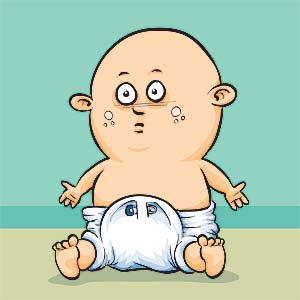Having absolutely none of my own, I can say with total certainty that raising a baby is difficult. It
looks hard enough, so I can only imagine actually
doing it. So without meaning to guilt any new parents out there who are probably only half-reading anyways, here are some hopefully-not-too hard tips on having a green baby. Figuratively, of course.

Before the baby is even born, there are multiple ways to cut down on waste. First off, even though Grandma wants to buy her future grandchild tons and tons of clothes, now is the time to curb that. Buy your baby a good number of simple, sustainable onesies made of organic hemp or cotton, bamboo or wool. They're better for baby's sensitive skin and hold up well to constant washing.
Don't be afraid to go second hand -- think of how long most kids wear clothes before they are outgrown. Second hand is not only sustainable but good for the pocketbook. If family and friends aren't coming through with enough, check out thrift shops or
CraigsList.
Same for furniture. Here, the only thing you really need to spring for new is a crib mattress and a car-seat. Garage sales always have strollers and entire sets of baby furniture. Another option is a crib that becomes a bed, so it can be used for a lot longer.
Breast-feeding is clearly more sustainable than bottle-feeding, but when "real" food enters the picture, what to do? This may sound really difficult, but it's really not (I was twelve when my youngest sibling was born and had to do it all the time). Make up batches of homemade baby food -- like cooked vegetables pureed in a blender -- and freeze it in little tupperware containers. There are literally thousands of recipes on-line if you want to safely expand baby's diet.
Lastly, the dreaded diaper debate. There are people who say that cloth diapers are not more sustainable than disposable ones because of the waste inherent in washing them. Nice try, but the fact remains, the 6,000 diapers the average baby will wear
do not decompose for hundreds of years. Even the biodegradable ones, because they need oxygen to biodegrade -- something not found when buried under a pile of garbage. Combining the diapers into one or two big loads a week is extra use of water, yes, but the environmental trade-off is clearly less than that of disposable. If you can afford a service, that's the way to go. The bulk washing reduces the overall amount of water used.
New cloth diapers on the market do not need to be pinned, there is no pre-soaking or ironing necessary and some even feature flushable liners to lighten the load, so to speak.
Writer: Kelli B. Kavanaugh
Illustration courtesy of istockphoto
Enjoy this story?
Sign up for free solutions-based reporting in your inbox each week.